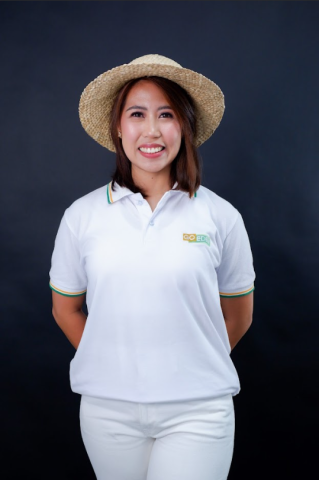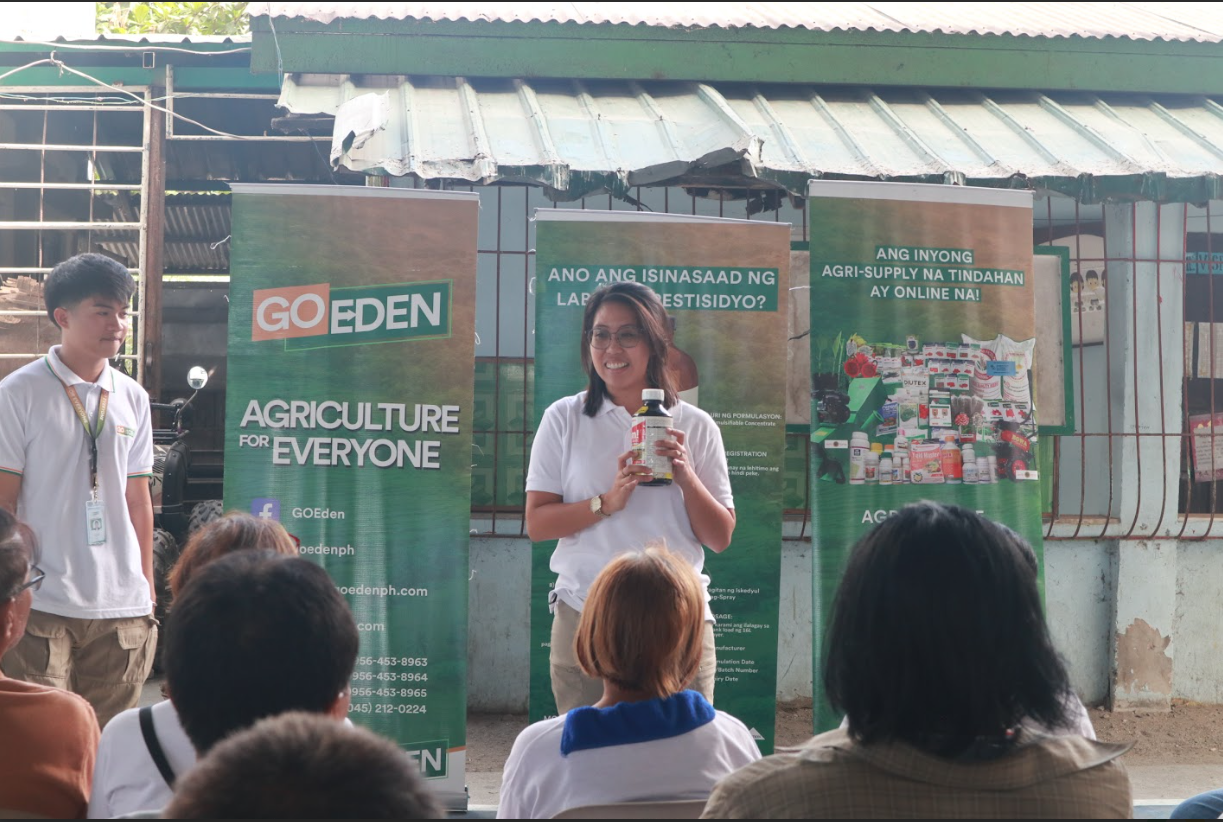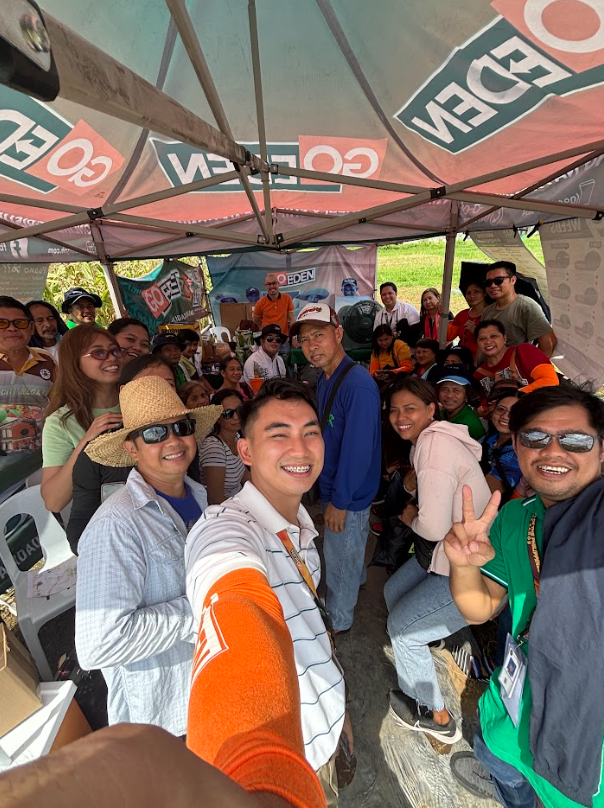
One Master of Business and Science (MBS) degree program graduate, Juca Lacsina, leveraged her MBS coursework to co-found GOEden in 2020, an agricultural startup that aims to consolidate fragmented supply chains for a more efficient delivery of agricultural supplies and services to farming communities in the Philippines. Lacsina is one of four co-founders of GoEden, including fellow MBS graduate Norence Tan (who leads product development and front-end initiative). We sat down with Lacsina to learn about her journey and how the MBS degree program has impacted her.
Coming from a family of farmers in rural Central Luzon, Lacsina's roots lie in the Filipino farming community. Prior to completing the MBS degree program with a concentration in global agriculture, Lacsina earned her bachelor's degree in Agronomy from University of the Philippines Los Baños, and was a full scholarship recipient from the United States Agency for International Development's Science, Technology, Research, and Innovation for Development (USAID-STRIDE) program. Lacsina has over 10 years of work experience with the government, private sector, research institutions, and the United Nations. Her expertise focuses on research, farm establishment and management, contract growing, project management for agricultural rural development, and post-typhoon and post-conflict recovery.
Why did you choose to enroll in the MBS degree program?
"All the pieces of the puzzle suddenly fit."
Although leaning towards an initial science career path, Lacsina was impressed with the level of depth in the business courses of the MBS degree. Coming from a non-business background, the goal of the MBS degree resonated with Lacsina – to combine science and business with real-world application.
Why did you decide to start GOEden?
"GOEden is a collective idea developed and polished by the founders," said Lacsina.
Drawing upon her decade of work in the agriculture industry, Lacsina saw the pain points farmers were facing. Although farmers have access to many brick-and-mortar stores, many still have to travel to multiple stores, far away from their location, to find specific inputs needed for their farms, said Lascina.
"It is the story of so many farmers living in remote, upland, or island farming communities."
Lacsina had experience working for the United Nations Food and Agriculture (UNFAO), where she saw that many projects struggled with the procurement of agricultural supplies given to farmers.
"It took us years to validate our assumptions [through] customer journey mapping, then I eventually quit my day job as a project manager at UNFAO and started GOEden in 2020."
What is it like to educate farmers about GOEden's product line?
"Challenging. Filipino farmers are victims of information asymmetry. Many cannot read nor write, yet all of our pesticide and seed packages are printed in English."
Lacsina notes that the company has to routinely adjust its language, marketing collaterals, and strategy to simplify the information for farmers.
"Our marketing is centered [on] educating farmers, teaching them how to make science-based decisions to increase farm productivity and profitability."
GOEden educates farmers through online campaigns (view their Facebook) and offline strategies, such as working with farmers directly in the field. One of the major difficulties faced by the company is the digital divide in the Philippines, where many have limited access to the internet.
What do you think makes GOEden so successful?
Lacsina notes that the company's biggest strength is its customer-centric approach to problem solving.
"At GOEden, our farmer-centric approach allows us to provide the highest quality of agricultural supplies to different end-users, most specifically to farmers having a hard time accessing brick and mortar agrisupply stores in upland, remote, and island farming communities through digital means."
With such a focus on farmers, GOEden has been able to serve a variety of markets such as small-holder farmers, cooperatives, government institutions, landscaping companies, hobbyists, and much more.
"To date, we have delivered agrisupplies to 240 municipalities in 72 provinces in the Philippines directly and indirectly serving nearly 100,000 farmers nationwide."
How did you use the skills you developed in the MBS program?
"A customer-centric approach to problem solving backed by a proper understanding of your financials, costs, margins, and revenue is a good head start. "
The MBS degree program equipped her with skills like pitching, negotiating, public speaking, and team collaboration that proved useful when building GOEden.
What MBS course helped you the most post-graduation?
Three courses from the MBS degree program stood out to her. The Science and Technology Management Capstone class served as a building block for GOEden's fundraising pitches. She also notes that Principles of Communication and Leadership and Principles of Finance and Accounting served as foundational knowledge for running GOEden.
Do you have any advice for current students?
"If you want to help address a pain point in a specific sector, build something that lasts," said Lacsina. Things that last take time. With strategies that are well thought out, most risks can be calculated and anticipated, but not all.
"Be patient. The day you plant the seed is not the day you eat the fruit."
Lacsina notes that students have to know their reason for being. Having a passion and care for your work makes all the difference in the output quality.
She shared a final piece of advice.
"I hope that you always choose the right thing. I hope that you surround yourself with people that will keep your moral compass in check. Money, fame, power—all of these have changed many people historically. And when you make it, I hope your compass still points to the true north and that you remain grounded no matter where your journey takes you."
Visit GOEden's website to learn more.



For more stories like this, see our previous MBS alumni spotlights:
- Chidera Okafor, MBS'17
- Matthew Brennan, MBS’17
- Trevor Johnson, MBS’20
- Tatiana Luts, MBS’23